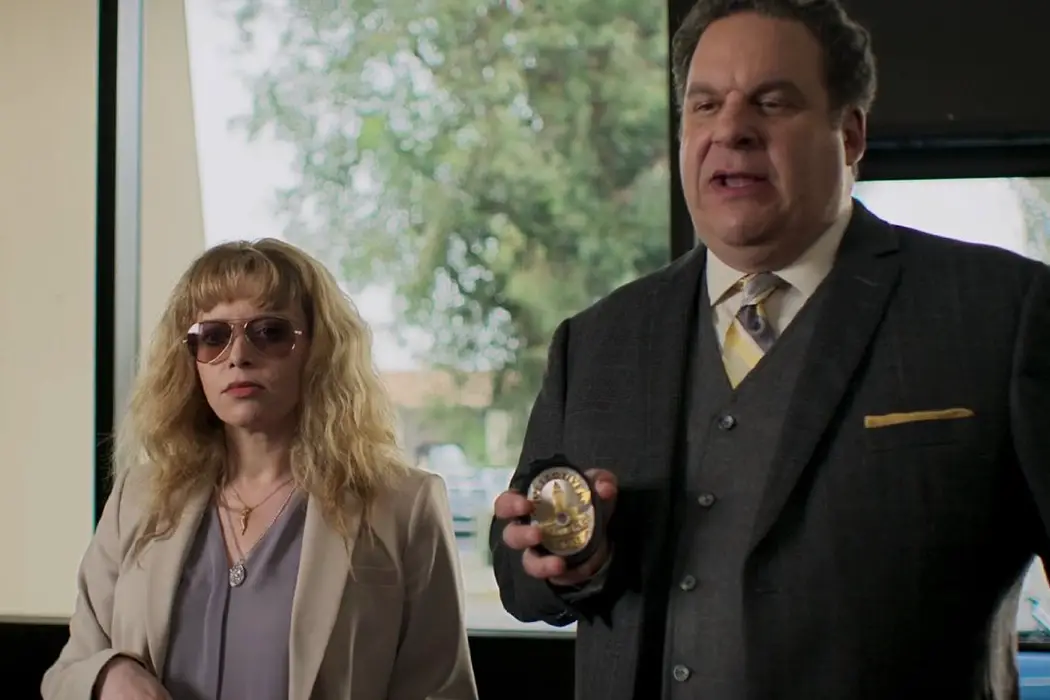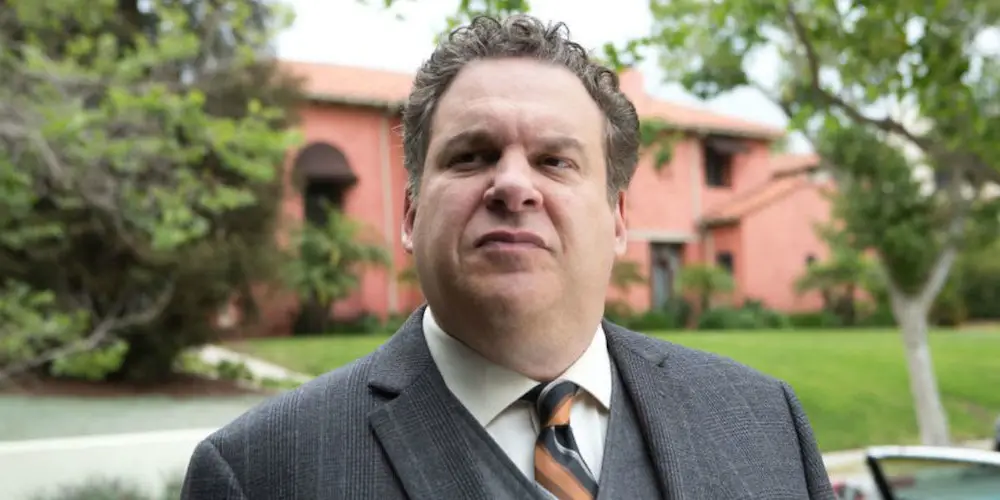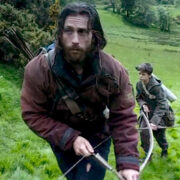HANDSOME: An Incompetent Netflix Thriller

Hazem Fahmy is a poet and critic from Cairo. He…
Everything you need to know about Jeff Garlin’s latest endeavor, Handsome: A Netflix Mystery Movie, is put on display in our very first scene. We open up on a gorgeous pool in, what appears to be, the decked-out garden of a Beverley Hills mansion. A wet and chiseled Steven Weber emerges from the water, smiles and looks straight to the camera. Without a hint of irony, he, Steven Weber, states: “Hello, I’m Steven Weber. I play the murderer in this Handsome Mystery Movie.” And with that, the film begins.
Running on a lean 81 minutes (that feels much longer), Handsome stars Garlin as Detective Handsome, an LAPD homicide detective who loves his job as much as his spotty Great Dane. He leads a relatively quiet life that is swiftly disrupted when his neighbor’s young babysitter’s head ends up on the lawn of another neighbor. The elaborateness of the crime (the rest of her body was chopped up and shaped like the Star of David) captures his intrigue and he sets out, determined to find the killer.
Close, but no Thrill
Brief as it is, the opening scene is a perfect summary of Garlin’s vision. It shows promise, intelligence, and a genuine desire to subvert expectations. It just doesn’t land. It’s hard to tell whether or not that’s due to a lack of trying, because Handsome tries. So hard. And perhaps that is the bigger issue. Every scene in the film feels like it’s begging to stand out, but they end up just feeling forced and sometimes even incoherent. Though he does seem to have a certain grasp on both, Garlin simply does not know how to balance his comic absurdity with his genre parody. The result: we end up with a mishmash that doesn’t fully showcase either.

A lot of this imbalance stems from a terribly disorienting lack of character and spatial framework. Played by Garlin himself, our titular protagonist’s life, a lonely detective in Los Angeles, is an ancient cinematic trope, one that has been done (and redone then reimagined) to death. And yet, Garlin barely plays around with this rich heritage. In fact, as a character, Detective Handsome doesn’t seem to belong to any tradition save that of awkward-but-lovable Garlin performances. Similarly, Garlin’s L.A. is a somewhat dull one that barely feels inhabited. This is partially because we spend the vast majority of our screen-time in the suburbs, giving the film a paradoxically quaint quality. But the far bigger issue is the film’s aesthetic and thematic detachment from its geography.
Take last year’s The Nice Guys, Shane Black’s wildly underrated dark comic take on the same trope of the lonely Los Angeles detective. Besides being a generally better written, shot and acted film, The Nice Guys succeeds where Handsome fails because its plot and humor are grounded in its characters and city. Ryan Gosling’s Holland March and Russell Crowe’s Jackson Healy are fully-fleshed people with clear wants, regrets, and flaws. The film sees them gallivanting across the city, encountering gangsters, porn stars, eco-protesters, government bureaucrats, and automobile overlords in the process. Black’s L.A. is alive with decadence and violence, and we get to witness that firsthand through the eyes of our protagonists.
City of Thrills
To be fair, Handsome’s L.A. was always meant to be a far quieter one; that of neighbors, dogs and babysitters. But again, Garlin spends far too little time building the world of Handsome’s suburb, the neighborhood dynamics, the individuals he passes by every day; and far too much time trying to be smart, yet goofy, with his dialogue. A painful example of this is Handsome’s two interactions with the neighbor’s pubescent child, Carys, who used to be babysat by the now deceased babysitter. Followed closely by her (inexplicably flamboyant) classmate and friend, Charles, she oscillates from showing Handsome respect, to totally ignoring him. But again, Handsome is not without merit. There are moments where you can see the film Garlin wanted, but didn’t know how to execute.

My absolute favorite scene in the entire film takes place shortly after the discovery of the babysitter’s body. As Handsome and his fellow homicide investigators stand on the neighbor’s lawn, observing the ghastly sight, a tacky double-decker bus full of Japanese tourists rolls by and stops in front of the house. Through the bus’s microphone, a chipper tour guide asks Handsome what is going on and he, only slightly taken aback, answers calmly. One of the tourists is confused as to the shape the dismembered body before her is making, so she asks the man sitting next to her, who casually responds that it is the Star of David, “a symbol of Judaism.” Excited, she gives her back to the camera and exclaims: “rabbi?” To that, a Japanese rabbi, fully clad in kippa and tallit, emerges from behind her and proceeds to explain how the Star of David is believed to be shaped after the shield that King David held in battle; a theory that, in his opinion, is not thoroughly supported by early rabbinical literature.
Verdict
Those two minutes from when the bus shows up to when we cut back to Handsome seem like the kind of film Garlin wanted to make: a poignant parody of the mystery thriller that is grounded in the absurdity and chaos of Los Angeles. Sadly, that is not the film Garlin made. Instead, we get an anticlimactic story of a quasi-mystery that, in its exhausting quest to be so aloof, ends up alienating rather than inviting the viewer, as Steven Weber attempted in that opening shot.
What did you think of Handsome? What’re your favorite L.A. mystery movies?
Handsome was released on Netflix on 5 May.
Does content like this matter to you?
Become a Member and support film journalism. Unlock access to all of Film Inquiry`s great articles. Join a community of like-minded readers who are passionate about cinema - get access to our private members Network, give back to independent filmmakers, and more.
Hazem Fahmy is a poet and critic from Cairo. He is an Honors graduate of Wesleyan University’s College of Letters where he studied literature, philosophy, history and film. His work has appeared, or is forthcoming in Apogee, HEArt, Mizna, and The Offing. In his spare time, Hazem writes about the Middle East and tries to come up with creative ways to mock Classicism. He makes videos occasionally.











